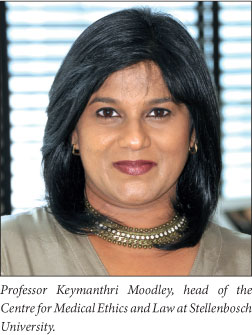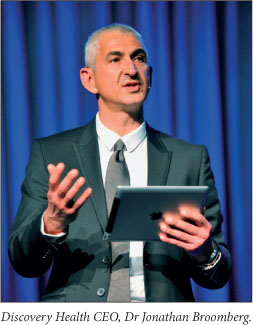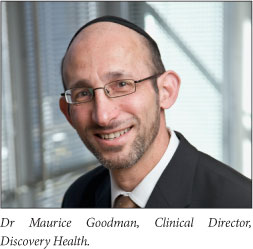Serviços Personalizados
Artigo
Indicadores
Links relacionados
-
 Citado por Google
Citado por Google -
 Similares em Google
Similares em Google
Compartilhar
SAMJ: South African Medical Journal
versão On-line ISSN 2078-5135
versão impressa ISSN 0256-9574
SAMJ, S. Afr. med. j. vol.102 no.7 Pretoria Jul. 2012
IZINDABA
Discovery to tighten disclosure protocol on new device
Chris Bateman
Hundreds of doctors in the country's three main cities last month queued up for a discounted Discovery Health iPad boasting a multi-purpose application revolutionising administration and patient management - as the company moved to address misgivings by a bioethics expert.
The iPad application, called Health ID, enables doctors to instantly access their patients' full medical records (with consent), prescribe medicines, refer, order pathology tests, view medical aid benefits and educate patients - with data uploaded to an information cloud' tended by Discovery. Discovery executives Jonathan Broomberg (CEO) and Maurice Goodman (Clinical Director) claim the iPad and its application will virtually eliminate doctors' afterhours administration work and enhance doctor/ patient relationships, saving everyone precious time and money. The device brings the local private sector up to speed with international best patient information and administration 'cyber-practice' and has met with wide acclaim for breaking new ground locally.
What's missing - expert
However, Professor Keymanthri Moodley, head of the Centre for Medical Ethics and Law at Stellenbosch University, believes the current electronic consent form fails to meet National Health Act requirements for consent in terms of full disclosure to patients of risks, benefits, alternatives and costs. Discovery briefed the Health Professions Council of South Africa's Registrar, Dr Buyiswa Mjamba-Matshoba, on 7 June, after which a presentation was scheduled for the council's Ethics Committee. Moodley was invited as a speaker by Discovery for the multi-city launch, delivering lectures in Johannesburg and Durban on the benefits and the risks of electronic health records and focusing on informed patient consent as a critical pre-requisite. Most doctors queued for the discounted iPads instead of attending her lecture, which she cancelled for the final Cape Town product launch. Asked why, she said she chose 'not to compete with the iPad sales'. Moodley said the current consent form seemed more a disclaimer protecting Discovery from patient litigation than informing patients fully of the risks and benefits. 'Either you sign it or you don't. It doesn't give patients the option of choosing which data they want released or not. Sensitive information like sexual history, psychiatric history, HIV/AIDS results, genetic test results, and a history of domestic violence is often regarded as private by patients who may legitimately want to exercise control over the disclosure to some of their healthcare providers. The system does not allow patients to sequester (hide bits of) information. Internationally this is an issue that has been raised and addressed,' she said.

Broomberg conceded that 'at this point we cannot sequester parts of the data', saying that acquiring this ability would require 'significant additional development'. He stressed that the application was 'a constant work in progress', adding that their current advice was that the consent process and disclosures were acceptable. 'We're fully aware that confidentiality and disclosure relating to medical information is both complex and subjective, and also dynamic, with societal views evolving over time ... we will continue to engage with Professor Moodley and other top experts in this field and will consult with the HPCSA to get their input and advice shortly,' he added. Broomberg promised that by July they would have updated the consent and disclosure processes 'at least once'.

No perversity 'shadow' - Broomberg
Dr Tony Berman, Treasurer of the national Independent Practitioners Association Foundation (IPAF), expressed reservations about 'what look like perverse incentives' being offered to doctors. 'I don't know why a R1 500 discount voucher on a R7 000 iPad or an enhanced consultation fee is necessary (R15 extra per consult enabling a preferred provider doctor to ostensibly pay off the device within months) - it takes me back to the days when you only needed to send one blood per day to certain path labs in return for a computer or an actual fee from the pathologist for using them exclusively. OK, so it's not 100% the same, but you get my point,' he said.
Berman, chief executive of Qualicare, the largest IPA in the Western Cape (some 649 GPs) said patients allowing Discovery access to 'a lot of intimate data' opened up the prospect of it being accessed or cross-referred at any time. 'You just need to take a slight step to the left; say you have a health or life policy with Discovery - how do we know they will not cross share that info?' he asked. Moodley said another worrying aspect was which other Discovery-linked healthcare providers could have access to the system in future (e.g. dentists, physiotherapists, pharmacists). 'The patient must decide who should have full (or partial) release of their health data. I wouldn't want my dentist to have my full medical history nor would some men want their physiotherapist to know they are on Viagra (for example),' she quipped. She added that secondary use of the health information collected via the new electronic system could include research; any research based on it would require separate ethical consent from patients and approval by a research ethics committee. The process of informed consent was another issue; getting patients to understand the information presented in simple language was critical. 'The current form needs significant revision to include all these (above) points and the consent process needs to enable a patient to take a hard copy home, read it and digest it before signing,' she warned. Moodley emphasised that Discovery seemed to be taking most of her feedback extremely seriously and were willing to revise the informed consent form and process.
The Discovery chief said there was 'no risk at all' of members' data being shared with other doctors once a member had given initial consent to one doctor. Members had to give consent separately to 'each and every doctor' prior to that doctor being able to view their electronic health record.
'Big brother eye on wellness' - claim
Berman said that rather than a voluntary approach to wellness, the new venture smacked of 'a big brother approach to wellness' and was being launched into a regulatory vacuum where HPCSA rules on electronics dated back to 2002 and CD Roms. 'For me this is a laudable advance, well ahead of its time, but the ground rules aren't in place yet.' Asked whether he was not opening himself up to accusations of 'sour grapes, Berman said no IPA could hope to move into the Discovery 'space'. 'They are the goliaths. This is like that Hello-Doctor cyber-consult thing, i.e. ahead of its time. In our context Discovery should rather be concentrating their efforts on primary health care and getting more patient feet through more doors. This is a huge amount of money on a highly sophisticated mechanism which would be fantastic in New York, Tokyo or London. We're not increasing the mere eight million people in our medical aid pool by doing this,' he observed.
Broomberg said Berman's view 'misses the point entirely'. Discovery had 'absolutely no financial interest' in doctors using HealthID. 'Our intention is simply to improve the quality of clinical care through sharing of important health information which facilitates care coordination, and to reduce the administration load for doctors.'
'How can a modest financial incentive to encourage behaviour which has a positive outcome for doctors and patients, and from which we do not profit at all, be seen as perverse?' he asked. He cited United States and Australian government initiatives offering hundreds of thousands of randequivalent incentives to all medical practices which adopted electronic medical records. 'This has the potential to change the way medicine is practised and bring us in line with some of the most innovative health systems in the world,' he added. Berman's other concern (about information integrity within Discovery businesses) was 'inaccurate', firstly because HealthID did not involve any data that Discovery did not already have access to (via member claims and pathology results). Secondly, Discovery never shared any member information, including claims information, without explicit member consent.
Genesis of iPad innovation
In a pre-launch briefing, Broomberg and Goodman told Izindaba that their being able to take advantage of the dexterous on-line application took 12 years; transforming the complex mass of raw Discovery claims data (pharmacy, hospital, doctor and pathology) into a usable electronic record - which the advent of the iPad two years ago, plus the increased ubiquity of 3G and WiFi technology, suddenly rendered an extremely powerful tool. Said Broomberg: 'Suddenly we had a sweet spot of technological connectivity and software coming together ... we'd been ready quite a while with the ability to interpret claims data'. A few deft finger presses now enabled a specialist seeing (for example) an 85-year-old with poor memory to quickly and accurately access their full medical history, an anaesthetist or surgeon to check on all preexisting conditions or access the full medical information management system (MIMS) directory. The possibilities were endless. Discovery are so confident of success after running pilot projects, first with 10 doctors nationally in March 2010 and then with 100 doctors five months later, that they're also offering the relevant software and data at no cost to those who sign up. They believe the benefits in gluing the traditionally fragmented South African healthcare model together via one portal (co-ordinated, efficient and enhanced quality of care with reduced admin burden) are so great that they've upped their consult pay-out to doctors who 'engage'.
Broomberg told Izindaba: 'We received five main messages from our pilot project doctors. 'Help us co-ordinate care, reduce the admin burden (now almost instant access to online chronic medication cover), give us e-scripting, med lists (plus how the patient is covered, co-payments, etc.) and mitigate our risks'. Some 4 000 doctors country-wide see mostly Discovery members. The technological package stands to enhance patient care in an environment where a paucity of information sharing and co-ordination often means not only a duplication of probes but an increased risk of costly slip-ups in both prepping and treating patients.

Discovery also purchased a library of some 300 on-line patient brochures which can be printed out or e-mailed to patients detailing or explaining their condition or elective procedure. 'We're at the beginning of the journey. We've relayed a rich amount of information and functionality which we'll enhance continually to make it more efficient and user-friendly,' Broomberg says.
Apple had sold more than 55 million iPads internationally by April this year, with over 200 000 specific applications and over one million downloads on the first day of availability. As an iPad adopter globally, the healthcare sector (10.5%) follows only financial services (36.6%) and the technology sectors (11.4%). A 2010 survey of 11 000 physicians in the Manhattan area showed that 72% carried smart phones and 95% of them were used to download medical information, with prescription drugs the number one download topic. Most used the technology during consultations or between patient visits with over 60% of patients expressing increased confidence in the doctor. An international survey also showed that a quarter of all healthcare providers used cyber 'tablets' at their practice, while another 21% expected to do so within the next 12 months. Two-thirds of them said implementing or improving their use of mobile technologies was a high or mid-level priority in the next year while 10% intended to use video conferencing with patients within that time.














